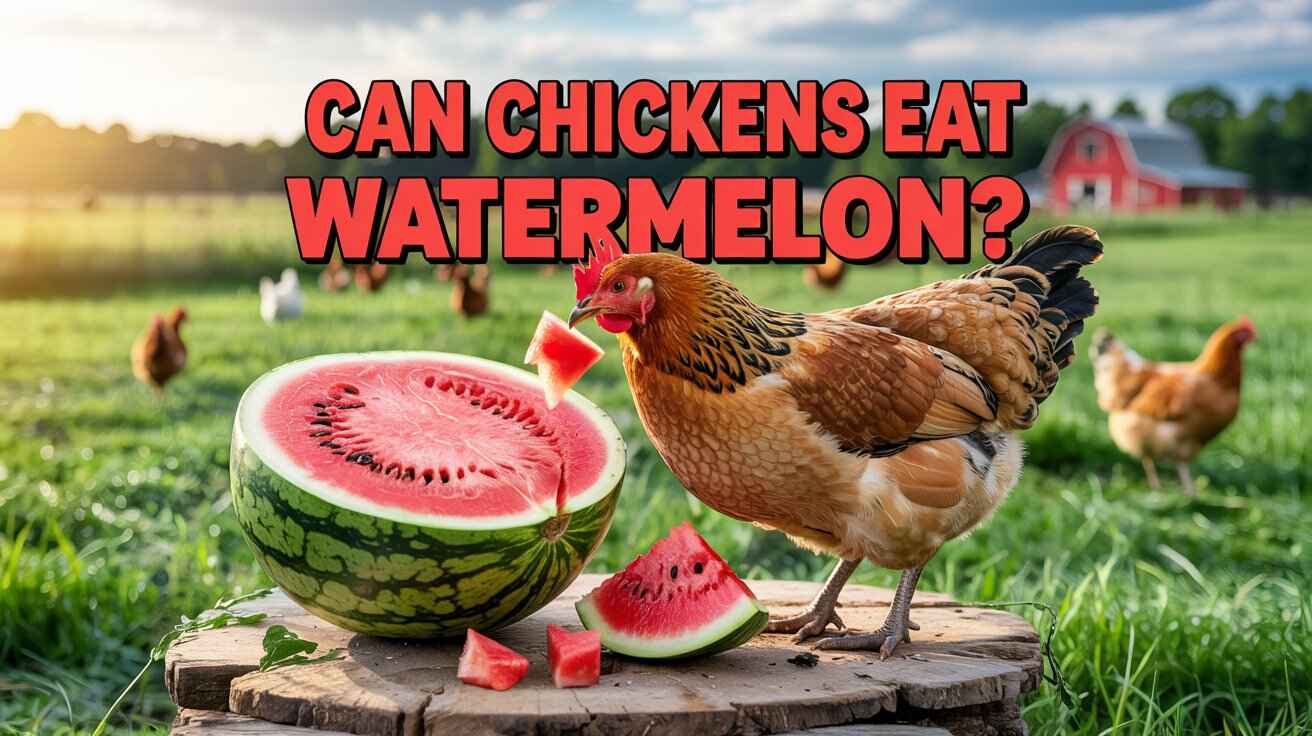When it comes to chickens, one of the most delightful things they can enjoy is watermelon. Not only do they love it, but it’s also a simple and fun way to feed them. Just by cutting open a melon and letting it feast, you’re offering them a refreshing treat that’s perfect for summertime.
For those who like to get a bit fancy, creating a cooling soup with a touch of mint can be a great way to mix things up for your flock. This treat is both hydrating and delicious, making it one of their favorite treats during hot days.
In my experience as a chicken keeper, I’ve noticed that chickens can struggle with heat stress, especially during the warm months. Unlike humans, they don’t sweat, so they rely on other ways to expel heat from their bodies. Their combs play a significant role here, acting like radiators to release excess body heat.
For breeds like Leghorn, Andalusian, Penedesenca, and Minorca, their large combs make them particularly adept at staying cool in Mediterranean climates. Still, it’s important to keep them comfortable by ensuring plenty of shade, ventilated coops, and cool water.
On particularly hot days, I’ve found that offering shallow tubs of water helps a lot. Chickens will often stand in these tubs or even dunk their heads to cool off and wet their combs. Adding ice cubes or frozen bottles to their waterers can also make a big difference.
For a bit of extra fun, throwing in chunks of watermelon gives them a chance to enjoy the flesh, seeds, and even the rind. It’s amazing how this plant, from its stalks to its leaves, is entirely edible for them.
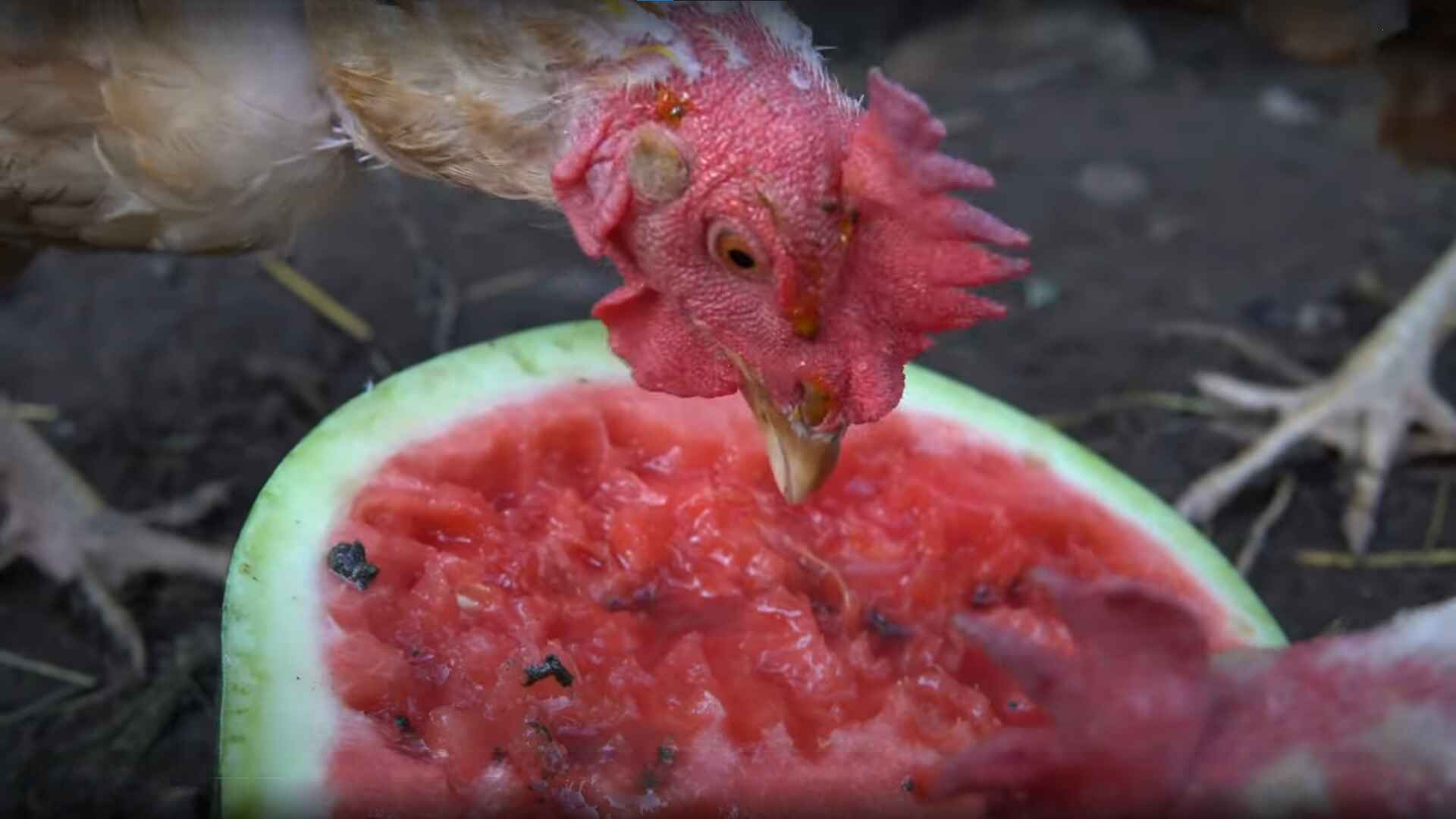
Table of Contents
ToggleCan Chickens Eat Watermelon?
Watermelon is a fantastic treat for chickens, offering many nutritional benefits that support their overall health. Packed with antioxidants, more than tomatoes or strawberries, it helps protect their cells from free radicals, reducing the risk of breakdown and chronic illness.
The high levels of lycopene, a powerful carotenoid, boost their immune system, while Vitamin C aids chickens in managing stress caused by excessive heat.
With naturally occurring electrolytes like potassium and magnesium, watermelon keeps chickens hydrated without needing extra supplements. It’s free of saturated fat and trans fats, and while it contains sugar, the benefits of its vitamins, minerals, and health-boosting properties far outweigh any negatives.
Including fruits and vegetables like watermelon in a natural diet for your livestock is a simple way to provide health-promoting benefits backed by modern research.f you’re exploring more options, you might also wonder Can Chickens Eat Potatoes?, another common kitchen ingredient worth looking into.

Can Baby Chickens Eat Watermelon?
Yes, baby chicks can enjoy watermelon, but there are a few things to keep in mind. According to a study, feeding watermelon flesh and seeds to chicks up to six weeks old had no adverse effects. However, because their digestive systems are still developed, they might avoid eating the rind. Offering it in moderation is very important since it helps them benefit from the hydration and nutrients that watermelon provides.
When I first introduced this treat to my young chicks at 17 weeks, they were hesitant, acting as though it was a “big red monster” ready to kill them! But once they tried it, they absolutely loved it. Remember, while watermelon offers many benefits, chicks also need a balanced feed for proper growth and should always have access to chick grit to support their diet.
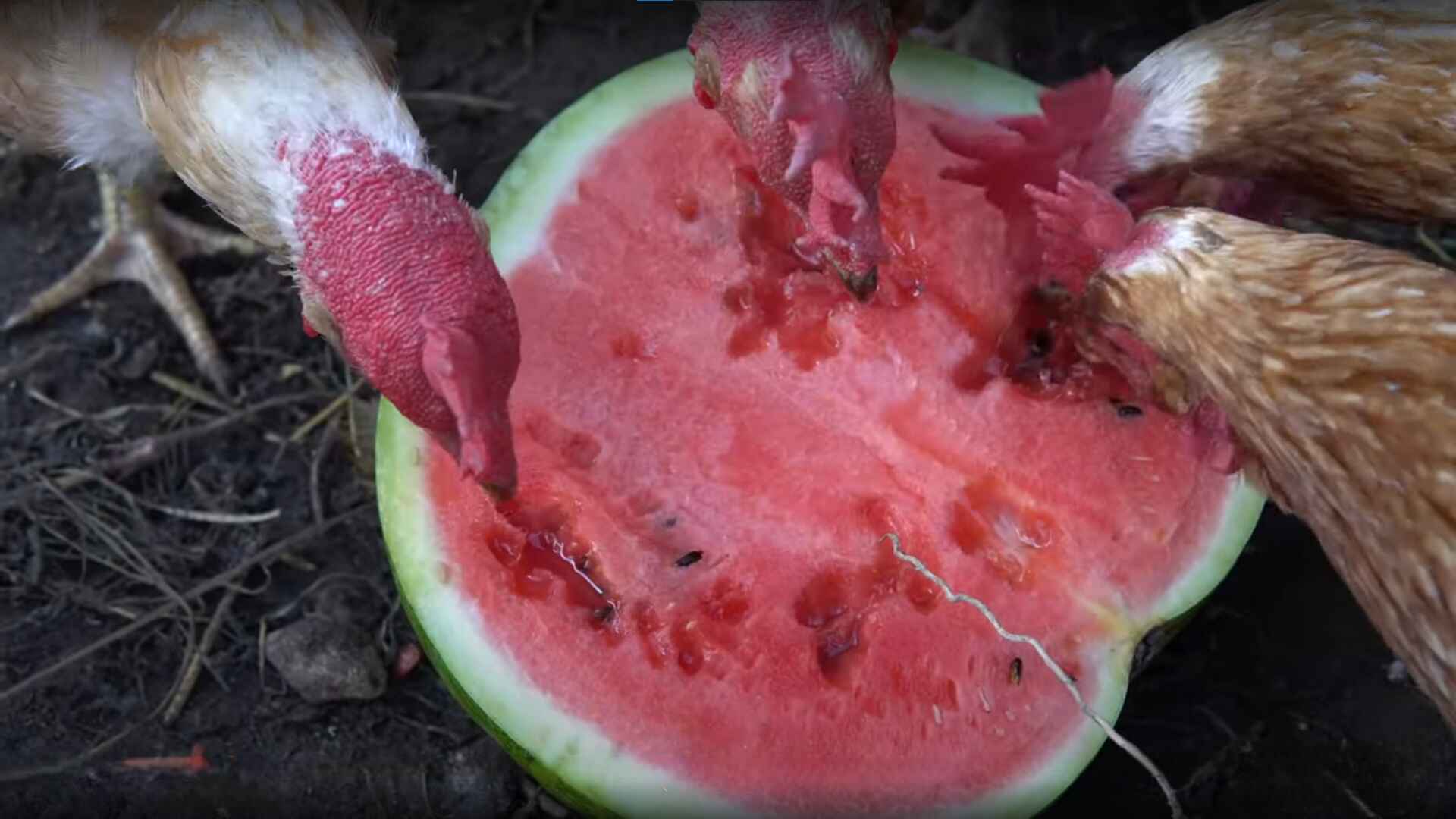
Can Chickens Eat Watermelon Flesh?
Chickens absolutely enjoy the flesh of watermelon, and it’s packed with benefits for their health. The fruit contains high levels of lycopene, beta-carotene, and antioxidants, all of which are great for keeping your flock healthy. Interestingly, carotenoids like beta-carotene can even give egg yolks a rich orange color.
When the flesh ripens, changing from a whiteish or pale pink to a deep red, its quality and quantity of nutrients improve significantly. While offering unripe watermelon isn’t harmful, it’s better to feed your chickens fully ripened pieces for the most striking benefits.
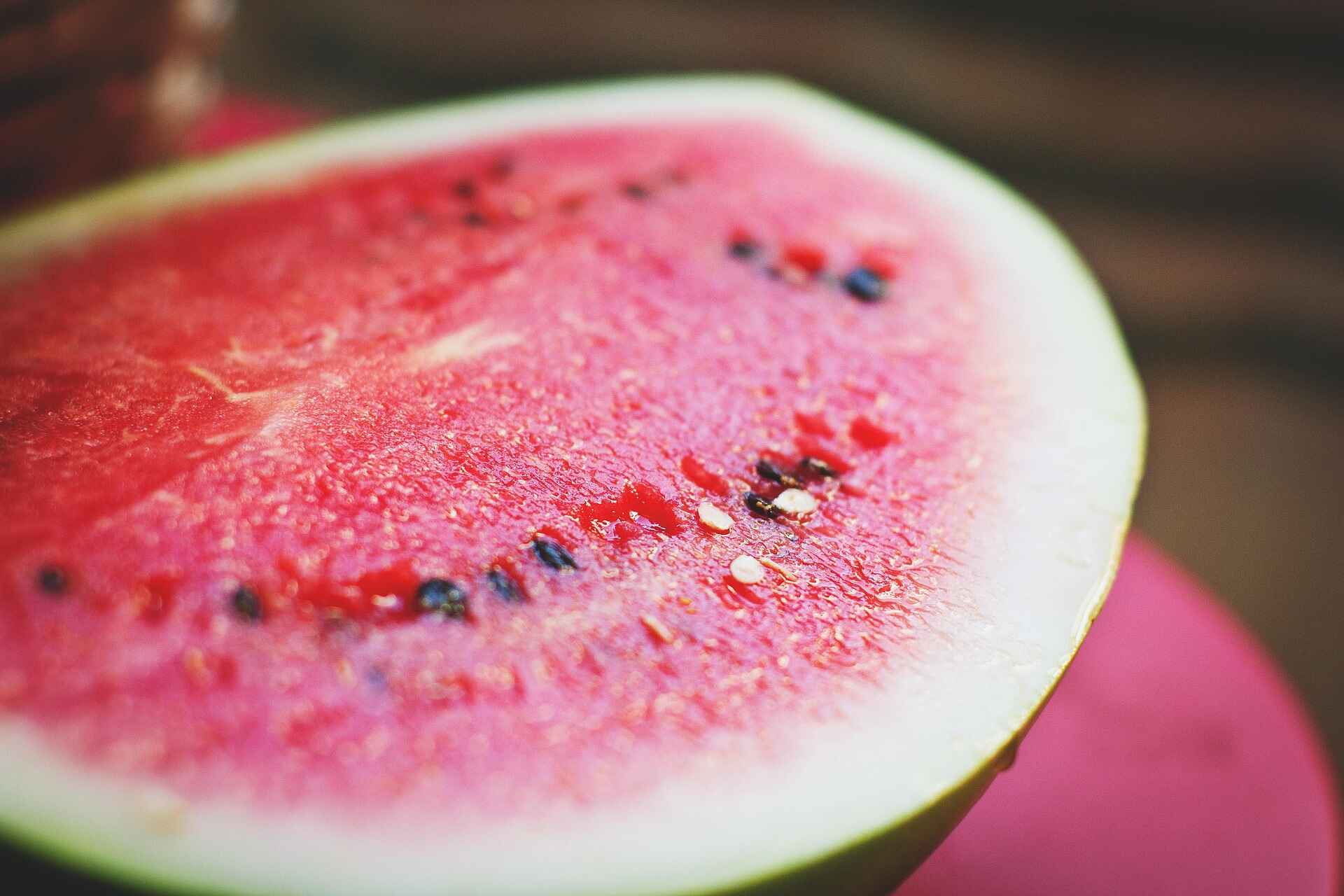
Can Chickens Eat Watermelon Seeds?
Yes, chickens can eat watermelon seeds, and my flock loves them! Research shows that the seeds are not just delicious but also packed with nutrition, including protein, calcium for bone strength, and potassium, an electrolyte that helps with hydration.
When a powder made from the seeds was added to the chicken feed (at no more than 10%), there was a noticeably positive effect on their growth and the number of eggs they produced.
However, moderation is key, as too much can be harmful. While some backyard keepers make claims about seeds being a natural de-wormer, there’s no scientific evidence to support this, despite what you may find on the internet.
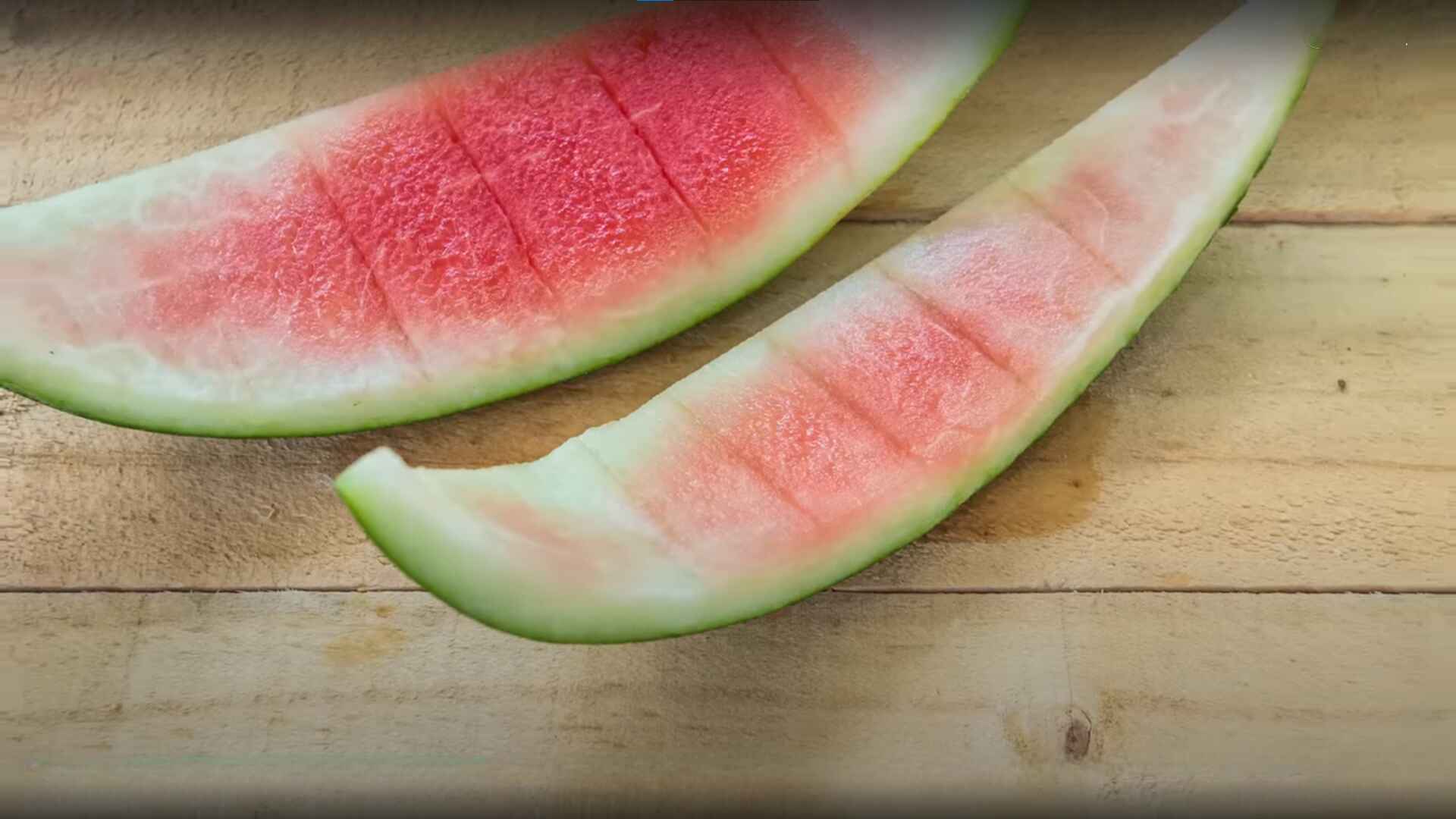
Can Chickens Eat Watermelon Rind?
Yes, chickens can eat watermelon rind, although it’s not their first choice of a tasty treat. The rind, often left untouched because it’s too thick and hard to peck, is surprisingly nutritious.
“Research shows that watermelon rind contains L-citrulline (L-Cit), a compound that can increase plasma L-Cit levels in chicks. A study found that feeding chicks a diet supplemented with dried watermelon rind significantly raised their plasma L-Cit levels, but it did not directly confirm an effect on reducing body temperature (Source). However, separate research indicates that synthetic L-Cit supplementation can help lower body temperature and improve heat stress tolerance in chicks (Source).”
It also supports a healthy digestive system, reducing harmful bacteria in the gut and aiding in dietary digestion. Instead of tossing the remains into the compost heap or bin, it’s better to feed this part of the watermelon to your flock, as it’s beneficial for their overall health and an excellent way to recycle food scraps.
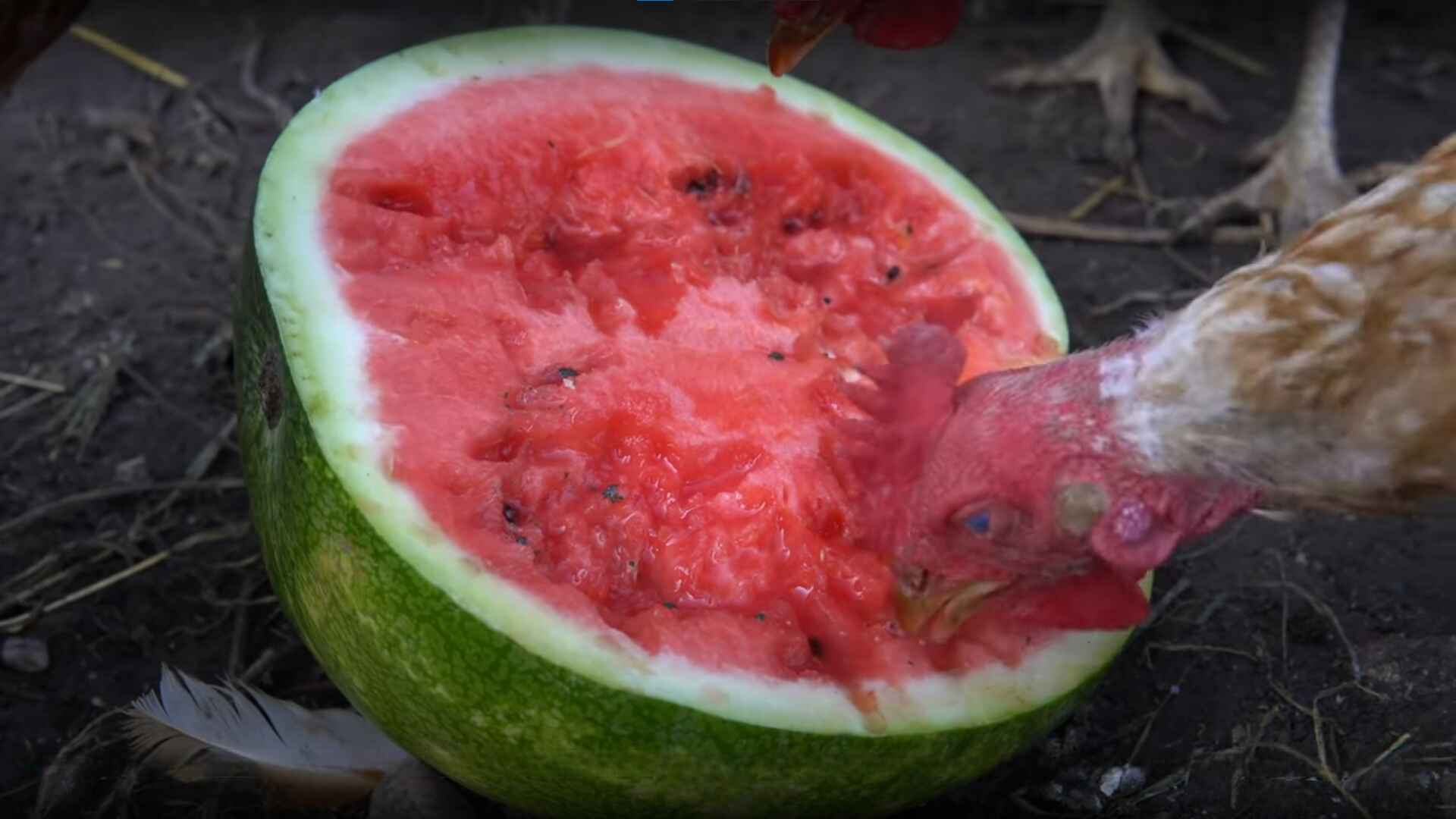
How to Feed Watermelon to Chickens
Chickens are always happy to eat watermelon, especially when it’s prepared just right. For a smaller flock, you can halve the fruit and let them dig into it on their own, straight out of the skin. If you want to give everyone a chance, simply slice it into portions that are easy to share. Whether you’re feeding them big chunks or smaller pieces, this treat is a great way to keep your flock satisfied.
Cooling Watermelon Soup with Mint
Making Cooling Watermelon Soup with Mint is a fun and simple way to keep your flock cool during the hot weather. To prepare, scoop out the insides of a halved watermelon and use a blender or food processor to purée the seeds, flesh, ice cubes, and fresh mint until the mixture is smooth. Pour the soup evenly into the empty green rind, add a few mint leaves as a garnish, and serve it in a shady spot on a hot day.
If your hen or another flock member shows signs of heat exhaustion, like labored breathing, lethargy, or pale wattles and comb, cool her legs and feet in the water and provide chilled drinks like Pedialyte or Gatorade to replenish lost electrolytes. Even offering chilled slices of watermelon in the summer is greatly appreciated by chickens.
Soothing Summertime Salad Recipe
This recipe is perfect for keeping your flock cool and refreshed during the summer. Combine water-dense fruits like watermelon and cucumber with nutrient-rich berries for a delicious, cooling treat. Start by grating the watermelon rind and dicing the cucumber, including the skin.
Add cubes of chilled watermelon, a handful of blueberries and strawberries, and a sprinkle of chopped mint leaves. Toss all the ingredients together in a bowl, and for an extra refreshing twist, freeze it for an hour before serving. Your chickens will love this salad, and you might find it hard to resist enjoying some yourself!
Minty Watermelon Summertime Slushie Recipe
Keep your flock cool during the summertime with this refreshing recipe. Start by cutting 4 cups of watermelon, including the rind and seeds, into cubes. Add two tablespoons of mint leaves, a tablespoon of organic honey, and six ice cubes into a blender.
Blend until the mixture is smooth and pour it into a freezable container. Freeze for two hours, then feed it to your chickens for a treat packed with nutrients. The juiced fruits not only make it easier to digest but also provide antioxidants, which help protect against cell damage. The mint adds a cooling agent, making this slushie perfect for hot days.
